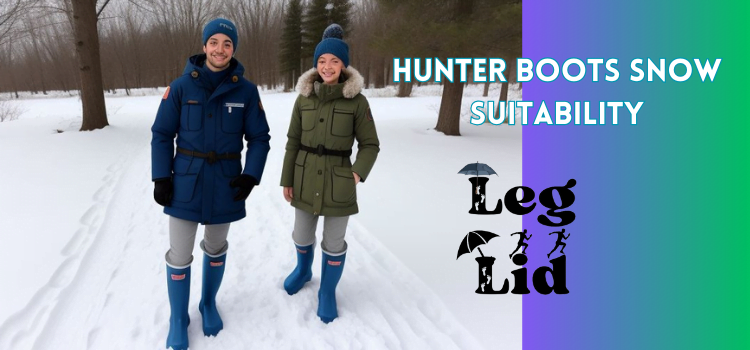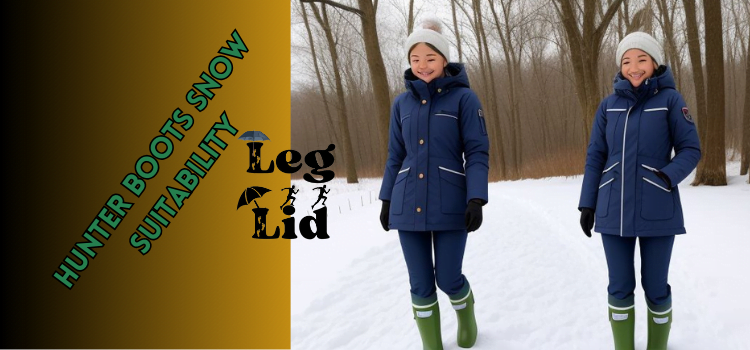Hunter Boots Snow Suitability Are you wondering if your stylish Hunter boots can handle the snowy weather? Well, the answer is not as straightforward as you might hope. While Hunter boots are known for their durability and waterproof properties, they are primarily designed for rain and not necessarily for snow. Let’s take a closer look at whether or not Hunter boots can be worn in the snow.
The Standard Hunter Rubber Boots
The standard Hunter rubber boot is not specifically designed for snowy conditions. While they may keep your feet dry from the snow or ice, they might not provide the same level of warmth and traction as you’d expect. Additionally, there is a risk of the rubber cracking if exposed to extremely cold temperatures.

Testing Your Boots for Warmth: Hunter Boots Snow Suitability
If you are determined to wear your Hunter boots in the snow, it’s crucial to test their warmth before braving the cold. Here’s how you can do it:
- Put on a pair of thick socks.
- Wear your Hunter boots and step outside into the cold.
- Assess how well your feet are insulated and if your toes feel warm.
It’s important to remember that while your boots may keep your feet dry, they might not provide enough insulation to keep them warm in extremely low temperatures.
Features of Hunter Boots: Hunter Boots Snow Suitability
Hunter boots are crafted from high-quality rubber, making them waterproof and suitable for wet conditions. Additionally, they often feature insulation to provide warmth in cooler temperatures. Their outsoles are designed to offer traction, which is essential for walking on slippery surfaces.
Suitability for Snow: Hunter Boots Snow Suitability
Pros of Wearing Hunter Boots in Snow
Hunter boots can indeed be worn in snow to some extent. Their waterproof construction helps keep feet dry in snowy conditions, preventing moisture from seeping in. The insulation in certain models provides some level of warmth, making them suitable for moderately cold temperatures. Moreover, their sturdy outsoles offer decent traction, which is advantageous when navigating snowy or icy terrain.
Limitations of Hunter Boots in Snow
While Hunter boots offer some benefits in snowy conditions, they may not be the best choice for heavy snowfall or extremely cold climates. The insulation in standard Hunter boots might not be sufficient for prolonged exposure to freezing temperatures. Additionally, their shaft height, typically reaching mid-calf, may not provide enough coverage to keep snow out effectively.
Tips for Hunter Boots Snow Suitability
To enhance the performance of Hunter boots in snow, consider the following tips:
Adding Warm Insoles
Inserting insulated insoles into your Hunter boots can provide extra warmth and comfort, especially on colder days.
Pairing with Thick Socks
Wearing thick, woolen socks with your Hunter boots can help trap heat and keep your feet cozy in snowy conditions.
Using Gaiters: Hunter Boots Snow Suitability
Gaiters are protective coverings worn over shoes or boots to prevent snow from entering. Pairing your Hunter boots with gaiters can help keep your lower legs and feet dry in deep snow.
Alternative Winter Footwear Options
While Hunter boots can be suitable for light snowfall and wet conditions, there are alternative footwear options better suited for harsh winter weather:
Snow Boots: Hunter Boots Snow Suitability
Snow boots are specifically designed for winter conditions, offering superior insulation, traction, and waterproofing compared to standard rubber boots.
Insulated Rubber Boots
Insulated rubber boots feature thicker insulation layers than traditional Hunter boots, providing enhanced warmth in colder temperatures.

Finding the Right Traction: Hunter Boots Snow Suitability
One of the most critical factors to consider when wearing boots in snowy conditions is traction. Slippery surfaces can be treacherous, and you want to ensure your boots offer excellent grip. While Hunter boots may have a decent outsole, it’s recommended to look for boots specifically designed for cold weather with an outsole optimized for icy and snowy terrains.
Alternatives to Hunter Boots in the Snow
If you’re planning to spend a lot of time in snowy conditions, it might be worth considering alternative boot options that are better suited for cold weather. Here are some popular choices:
| Brand | Features |
|---|---|
| Sorel | Excellent traction, insulation, and durability |
| Merrell | Waterproof and insulated with good traction |
| UGG Butte | Warm and waterproof with a rugged outsole |
| Baffin | Designed for extreme cold with superior insulation |
These are just a few examples, and there are many other trusted brands that offer boots specifically designed for snow and cold weather conditions.
FAQ Of Hunter Boots Snow Suitability
- Can Hunter boots handle deep snow? Hunter boots can handle light to moderate snowfall but may not provide sufficient coverage for deep snow due to their mid-calf shaft height.
- Are Hunter boots warm enough for winter? While Hunter boots offer some insulation, they may not be warm enough for prolonged exposure to freezing temperatures. Adding warm insoles and thick socks can help increase warmth.
- Do Hunter boots provide good traction on icy surfaces? Yes, Hunter boots feature outsoles designed to provide decent traction on icy surfaces, but caution should still be exercised on extremely slippery terrain.
- Can I wear Hunter boots in heavy rain and snow? Yes, Hunter boots are designed to be waterproof and can be worn in both rain and snow. However, they may not provide adequate warmth for prolonged exposure to cold temperatures.
- How should I care for my Hunter boots in snowy conditions? After wearing Hunter boots in snowy conditions, it’s essential to clean off any salt or dirt residue with a damp cloth and allow them to air dry. Applying a rubber conditioner can help maintain their durability and waterproofing properties.
Conclusion: Hunter Boots Snow Suitability
While Hunter boots can handle light snow and icy conditions, they are not the best option for heavy snowfall or extreme cold temperatures. If you’re set on wearing your Hunter boots in the snow, make sure to test their warmth and consider adding an extra layer of insulation with thick socks or boot liners.Hunter Boots Snow Suitability! However, for prolonged exposure to snowy conditions, it’s advisable to invest in boots specifically designed for winter weather to ensure optimal warmth and traction.
Leave a Reply